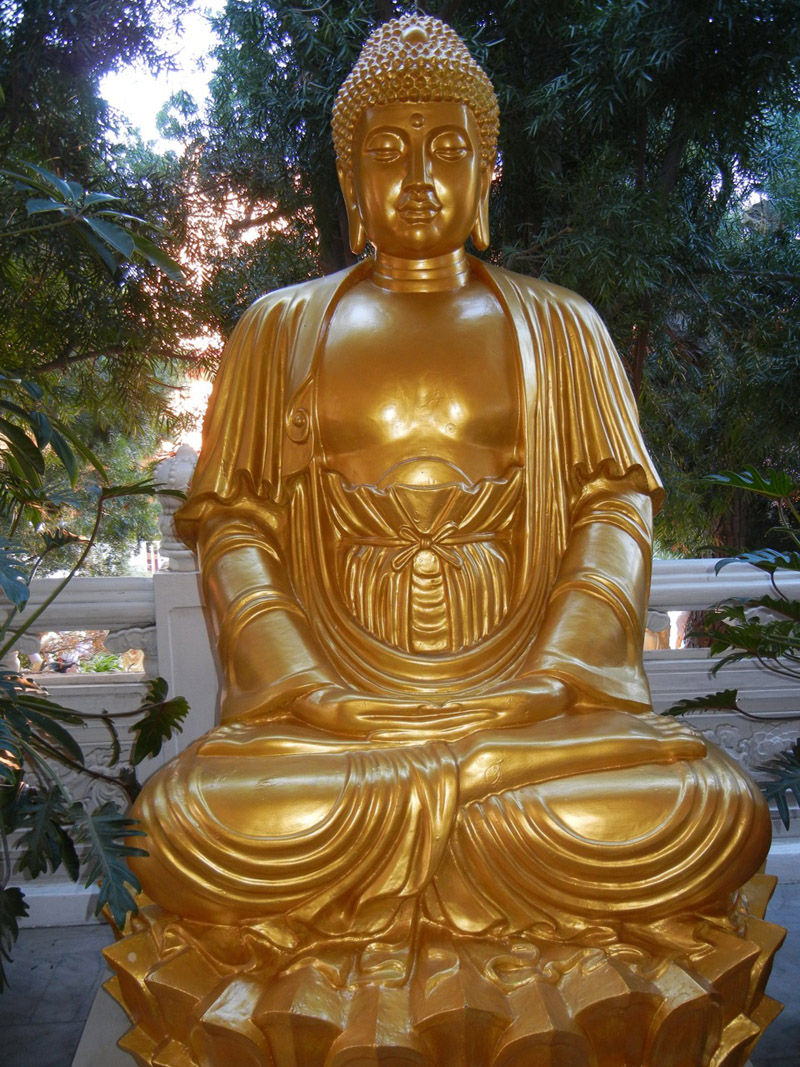Moderation: A Key to Success in Life
- Kenneth Cohen
- Dec 11, 2021
- 4 min read
©2021 Kenneth S. Cohen

Photo of the Buddha by Ken Cohen at 佛光西來寺 Buddha Light Hsi Lai Temple, California
The principle of moderation occurs again and again in the Dao De Jing: “If you pound an edge to sharpness, it will not last long.” (Ch 9) “Those who embrace this Dao do not wish to be full.” (Ch 15) “The sage forgoes extremes, excess, and extravagance.” (Ch 29) “One who is contented does not suffer disgrace; one who knows when to stop is free of danger and thus can achieve longevity.” (Ch 44). Too many laws erode the innate and intuitive sense of right and wrong, thus encouraging lawbreakers. “The more laws and mandates, the more thieves and robbers abound.” (Ch 57) which essentially an expansion of a theme presented in Chapter 5: “The sage is not a do-gooder.” Confucius is also famous for his emphasis on moderation: “To exceed is as bad as to fall short.” (Analects Chapter 11). Moderation is the essence of mental and moral balance, an underlying theme in the Confucian classic, Zhong Yong (The Doctrine of the Mean). No wonder Chinese people were able to easily relate to the Buddhist principle of “The Middle Way” when Buddhist pilgrims first brought the Dharma (teachings) to China centuries later. The Buddha had discovered that wisdom could no more be found in a king’s palace than in an ascetic’s cave; like the string of a sitar, it must be strung neither too tight nor too lose to produce just the right, beautiful note.
The theme of moderation underlies virtually all Chinese arts, from painting to poetry to qigong. Yin and yang are kept in balance and neither goes to extremes: there is always a drop of yin within yang, a drop of yang within yin. In the martial arts, an attack has the potential for defense, a defensive move contains the seed of attack. Stillness is the root of movement; movement is the root of stillness. And this gem from the Taijiquan Treatise (Taijiquan Lun) “Neither overdo nor underdo.” One could also translate this sentence as “Neither excess nor insufficiency.” It takes a lifetime of practice to master this one principle.
From my observations, students tend to do too much; they exaggerate the size of a movement and use too much force, lifting a shoulder when they intend to only lift an arm, tightening their face when dropping into a low stance, or just using the wrong muscles for a task because of lack of body awareness. But paradoxically, although they misplace effort (overdoing), they undertrain (underdoing), believing that they will develop skill (gong) and inner strength (jin), magically, without diligent practice. Additionally, if dysponesis (misplaced neurophysiologic responses) occurs during Taijiquan practice, then students are probably doing this in everyday life and thus dissipating and exhausting their reserves and reducing resilience—the ability to spring back after stress. In the martial arts both excess and insufficiency create vulnerability. Too much tension means slow movements and slow reaction time. Too big a movement means that the opponent can easily avoid your attack while “returning fire.” On the other hand, deficient movement, such as not reaching the target is useless. Or a deficient shape—such as the arms too close to the body or a collapsed or fearful posture, says “please hit me.” Again, moderation is the key.
Moderation is an important aspect of the fundamental Taoist concept of wu wei, literally “no action” or “action (wei) that proceeds out of emptiness (wu),” free of conditioning and coercion, arising spontaneously (zi ran) in accord with nature. Such action is not extreme. A flower uses only the nutrients necessary for its growth; it does not block absorption of minerals because of a false belief in unworthiness, nor does it egotistically hoard water or sunlight. Jesus got it right, “Consider the lilies, how they grow.”
On a psychological level, moderation is the opposite of bipolar disorder, characterized by moods that swing and cycle between elevated, hypomanic episodes and apathy/depression. I am not surprised at the documented increase in the rates of bipolar disorder, especially among adolescents and youth, an increase that cannot be explained by greater availability of mental health services or attention paid to the diagnosis. https://journalbipolardisorders.springeropen.com/articles/10.1186/s40345-014-0010-0 It seems to me that rising levels can be attributed at least in part, to lack of time spent in nature and attuning to nature’s example of balance and moderation.* Neither looking at nature on computer screens or tv documentaries nor being an environmental activist have any personal impact on nature deficit disorder and its sequelae. I am certainly not denying the need for psychiatric treatment of bipolar disorder. When people are suffering from psychiatric disease, they are unhappy and could be of danger to themselves or others. However, for long term personal and social change, we need nature, mindfulness, and natural restorative movements such as qigong and Taijiquan.
*although we must admit that because of human abuse and interference with natural systems, nature herself seems to be developing prolonged and more recurrent mood swings




